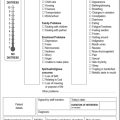24 Living with and beyond cancer
Points to consider
Because historically cancer survival rates have been so poor, there has been a lack of focus on how best to support individuals beyond diagnosis and treatment. With the increasing number of cancer survivors and the chronic nature of the disease, this has begun to change and the National Cancer Survivorship Initiative (Department of Health et al 2010) is focused on possible ways of supporting and prompting self-care in these individuals, as well as the research needed to identify the true extent of the long-term implications of cancer on individuals and society.
As a cancer survivor and a clinician, Mullan (1985:273) summarises: ‘We can no longer save people from drowning [and then] leave them on the dock to cough and splutter on their own, in the belief we have performed all we can’.
Office for National Statistics. Survival rates in England, patients diagnosed 2001–2006. London: ONS; 2007.
Rachet B., Maringe C., Nur U., et al. Population-based cancer survival trends in England and Wales up to 2007: an assessment of the NHS cancer plan for England. Lancet Oncol.. 2009;10(4):351–369.


